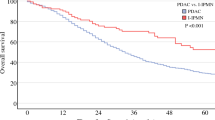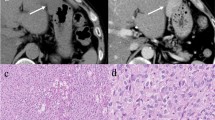Abstract
Purpose
Acinar cell carcinoma (ACC) of the pancreas is a very rare cancer, constituting 1 % of all malignant non-endocrine pancreatic tumors. Only very limited data exist to guide treatment in patients with advanced ACC.
Methods
Between 2000 and 2015, 15 patients with ACC were diagnosed and/or treated at our high-volume comprehensive cancer center. Medical records and correlating serum levels of the potential serum tumor markers CA 19-9, CEA and lipase were analyzed retrospectively.
Results
A substantial antitumor activity was observed for treatment regimens containing 5-FU and oxaliplatin with partial responses or prolonged disease stabilizations (>12 months) observed in 6 out of 7 patients (86 %). Activity was also observed for single-agent 5-FU and its oral prodrugs. Serum lipase levels were elevated in 7 of 12 patients with advanced disease (58 %), whereas CEA and CA 19-9 seemed to be of minor importance for ACC (elevated pre-treatment levels in 4/12 and 3/12 cases, respectively). In selected patients, repeated serum lipase measurements were available and accurately predicted response to chemotherapy and relapse after surgery.
Conclusions
5-FU- and oxaliplatin-containing regimens are active in advanced ACC. Lipase kinetics may be a useful novel tool to monitor the course of disease as well as treatment effects in ACC.

Similar content being viewed by others
Abbreviations
- ACC:
-
Acinar cell carcinoma
- CA 19-9:
-
Carbohydrate antigen 19-9
- CEA:
-
Carcinoembryonic antigen
- ECOG:
-
Eastern Cooperative Oncology Group (ECOG) score
- OS:
-
Overall survival
- PDAC:
-
Pancreatic ductal adenocarcinoma
References
Ashley SW, Lauwers GY (2002) Case records of the Massachusetts General Hospital. Weekly clinicopathological exercises. Case 37-2002. A 69-year-old man with painful cutaneous nodules, elevated lipase levels, and abnormal results on abdominal scanning. N Engl J Med 347:1783–1791. doi:10.1056/NEJMcpc020019
Callata-Carhuapoma HR et al (2015) Pancreatic acinar cell carcinoma with bilateral ovarian metastases, panniculitis and polyarthritis treated with FOLFIRINOX chemotherapy regimen. A case report and review of the literature. Pancreatology 15:440–444. doi:10.1016/j.pan.2015.04.006
Chmielecki J et al (2014) Comprehensive genomic profiling of pancreatic acinar cell carcinomas identifies recurrent RAF fusions and frequent inactivation of DNA repair genes. Cancer Discov 4:1398–1405. doi:10.1158/2159-8290.CD-14-0617
Cubilla AL, Fitzgerald PJ (1975) Morphological patterns of primary nonendocrine human pancreas carcinoma. Cancer Res 35:2234–2248
Furukawa T et al (2015) Whole exome sequencing reveals recurrent mutations in BRCA2 and FAT genes in acinar cell carcinomas of the pancreas. Sci Rep 5:8829. doi:10.1038/srep08829
Hall JC et al (2016) Novel patient-derived xenograft mouse model for pancreatic acinar cell carcinoma demonstrates single agent activity of oxaliplatin. J Transl Med 14:129. doi:10.1186/s12967-016-0875-z
Hartwig W et al (2011) Acinar cell carcinoma of the pancreas: is resection justified even in limited metastatic disease? Am J Surg 202:23–27. doi:10.1016/j.amjsurg.2010.06.004
Holen KD, Klimstra DS, Hummer A, Gonen M, Conlon K, Brennan M, Saltz LB (2002) Clinical characteristics and outcomes from an institutional series of acinar cell carcinoma of the pancreas and related tumors. J Clin Oncol 20:4673–4678
Jiao Y et al (2014) Whole-exome sequencing of pancreatic neoplasms with acinar differentiation. J Pathol 232:428–435. doi:10.1002/path.4310
Kitagami H, Kondo S, Hirano S, Kawakami H, Egawa S, Tanaka M (2007) Acinar cell carcinoma of the pancreas: clinical analysis of 115 patients from Pancreatic Cancer Registry of Japan Pancreas Society. Pancreas 35:42–46. doi:10.1097/mpa.0b013e31804bfbd3
Kruger S et al (2014) Translational research in pancreatic ductal adenocarcinoma: current evidence and future concepts. World J Gastroenterol 20:10769–10777. doi:10.3748/wjg.v20.i31.10769
La Rosa S et al (2012) Clinicopathologic study of 62 acinar cell carcinomas of the pancreas: insights into the morphology and immunophenotype and search for prognostic markers. Am J Surg Pathol 36:1782–1795. doi:10.1097/PAS.0b013e318263209d
La Rosa S, Sessa F, Capella C (2015) Acinar cell carcinoma of the pancreas: overview of clinicopathologic features and insights into the molecular pathology. Front Med 2:41. doi:10.3389/fmed.2015.00041
Lowery MA, Klimstra DS, Shia J, Yu KH, Allen PJ, Brennan MF, O’Reilly EM (2011) Acinar cell carcinoma of the pancreas: new genetic and treatment insights into a rare malignancy. Oncologist 16:1714–1720. doi:10.1634/theoncologist.2011-0231
Schmidt CM, Matos JM, Bentrem DJ, Talamonti MS, Lillemoe KD, Bilimoria KY (2008) Acinar cell carcinoma of the pancreas in the United States: prognostic factors and comparison to ductal adenocarcinoma. J Gastrointest Surg 12:2078–2086. doi:10.1007/s11605-008-0705-6
Simon M, Bioulac-Sage P, Trillaud H, Blanc JF (2012) FOLFOX regimen in pancreatic acinar cell carcinoma: case report and review of the literature. Acta Oncol 51:403–405. doi:10.3109/0284186X.2011.617388
Wisnoski NC, Townsend CM Jr, Nealon WH, Freeman JL, Riall TS (2008) 672 patients with acinar cell carcinoma of the pancreas: a population-based comparison to pancreatic adenocarcinoma. Surgery 144:141–148. doi:10.1016/j.surg.2008.03.006
Zheng ZJ, Gong J, Xiang GM, Mai G, Liu XB (2011) Pancreatic panniculitis associated with acinar cell carcinoma of the pancreas: a case report. Ann Dermatol 23:225–228. doi:10.5021/ad.2011.23.2.225
Zundler S et al (2016) Pancreatic panniculitis in a patient with pancreatic-type acinar cell carcinoma of the liver—case report and review of literature. BMC Cancer 16:130. doi:10.1186/s12885-016-2184-6
Acknowledgments
This work is part of the doctoral thesis of Johannes Philipp Burger.
Author information
Authors and Affiliations
Corresponding author
Ethics declarations
Conflict of interest
Stefan Boeck has received honoraria for scientific presentations from Celgene and Roche, research funding from Celgene, Clovis Oncology and Roche, travel grants from Celgene and Roche, and acted as consultant for Celgene and Baxalta. Michael Haas has received honoraria for scientific presentations from Celgene, research funding (for his institution) from Boehringer Ingelheim and Roche, and travel grants from Boehringer Ingelheim and Celgene. Volker Heinemann has received honoraria for scientific presentations from Baxalta, Celgene and Roche, research funding from Celgene and Roche, and acted as consultant for Baxalta, Celgene and Roche. Thomas Kirchner has received honoraria for scientific presentations from Merck KGaA, and AstraZeneca, research funding from Merck and Roche, and acted as consultant for Amgen, AstraZeneca, Merck, MSD, Pfizer and Roche. All other authors declare no conflict of interest.
Ethical standard
All procedures performed in studies involving human participants were in accordance with the ethical standards of the institutional research committee and with the 1964 Helsinki Declaration and its later amendments or comparable ethical standards. For this retrospective study, formal consent was not required (Approval Number 134-15, Ethics Committee Ludwig-Maximilians-University Munich).
Rights and permissions
About this article
Cite this article
Kruger, S., Haas, M., Burger, P.J. et al. Acinar cell carcinoma of the pancreas: a rare disease with different diagnostic and therapeutic implications than ductal adenocarcinoma. J Cancer Res Clin Oncol 142, 2585–2591 (2016). https://doi.org/10.1007/s00432-016-2264-7
Received:
Accepted:
Published:
Issue Date:
DOI: https://doi.org/10.1007/s00432-016-2264-7




